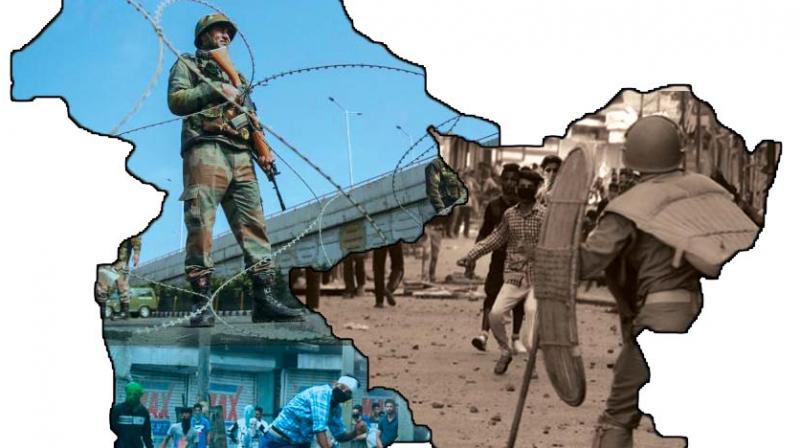Scotland & Kashmir: Parallel, separate narratives
The sense of separateness runs high this week as Scots recall the fifth anniversary of the independence referendum.

It’s difficult to think of turbulent Jammu and Kashmir in tranquil Scotland where 55.3 per cent of voters rejected independence in a 2014 referendum, against 44.7 per cent who supported it. But the suggestion that all powers other than those that are essential for streamlined governance (defence, foreign affairs, currency) should be transferred to the Scottish government recalls the logic of Articles 370 and 35A. The rationale in both situations is that a loose federation has a better chance than a rigid one of absorbing ethnic and other tensions.
The sense of separateness runs high this week as Scots recall the fifth anniversary of the independence referendum. There are no “azaadi” chants, no “Independence for Scotland” posters in Edinburgh, Glasgow, Inverness or Kirkwall in the remote Orkneys. But bus drivers in all these places politely declined the bus pass I had acquired in London. “This is Scotland”, they said. “That’s only for England.” It was a reminder that the head of Scotland’s regional administration, Nicola Sturgeon, styled First Minister, has warned that a new independence referendum would be “highly likely” if Boris Johnson, the Prime Minister, doesn’t “die in a ditch”, as he has threatened to do if Britain does not leave the European Union on October 31.
Ms Sturgeon has been the First Minister since 2016 when her Scottish Nationalist Party won 63 of the 129 seats in the devolved Scottish Parliament created in 1997.
She believes that the situation changed when the UK voted in 2016 to leave the European Union.
That vote reflected English rather than Scottish views. With another election due in 2021, the party argues that Brexit marks a material change and that it is only fair to allow the Scottish people to vote again on whether or not to remain tied to England.
London has so far refused to allow this, but nationalist Scots hold (along with Kashmiris and Bangladeshis) that people have a continuing option to decide their future.
Alex Salmond, a former First Minister, says: “If I had but known five years ago that Boris Johnson would become Prime Minister and Britain would be poised on the brink of a hard Brexit, then I would have delayed the (2014) Scottish referendum.”
He “now looks forward to a 60 per cent plus Yes vote...” Calculating the odds, Mr Salmond can scent what appears to be a growing division between public opinion north and south of the border.
Covering the northern one-third of the island of Great Britain, surrounded by the Atlantic Ocean to the north and west, the North Sea to the northeast and the Irish Sea to the south, Scotland with nearly 800 islands was historically an independent kingdom that fought the Romans and the English through the centuries. By inheritance King James VI of Scotland became King James I of England and Ireland in 1603. Not everyone welcomed Scotland’s decision in 1707 to enter into a political union with England.
While anti-union riots erupted in Edinburgh, Glasgow and elsewhere in Scotland, English resentment found expression in Guy Fawkes’ plot to blow up the Houses of Parliament in London. Asked why he had amassed so much gunpowder, Fawkes had then famously replied “to blow Scotsman (meaning James I) back to Scotland”.
The Scottish Enlightenment and the Industrial Revolution turned Scotland into an intellectual, commercial and industrial powerhouse, with Voltaire declaring: “We look to Scotland for all our ideas of civilisation.” Keir Hardie founded the Scottish Labour Party, and militant trades unionists launched the “Red Clydeside” movement.
Glasgow became one of the world’s largest cities, Clydeside was the world’s pre-eminent shipbuilding centre, and trade blossomed when tariffs with England were abolished. As the demand for home rule gathered strength, First Minister Jack McConnell hailed Vladimir Putin’s visit to Edinburgh as a step towards “Scotland regaining its international identity”.
It was reported when the SNP first began to attract attention that Queen Elizabeth II had made discreet inquiries through her officials about the party’s stand on the monarchy. That incident was recalled when Ms Sturgeon recently implied that being above politics, the Queen should refuse to be drawn into a future vote on Scottish independence. Her warning came after David Cameron, the former Prime Minister, boasted in a BBC interview recently that he had asked in 2014 whether the monarch could “raise an eyebrow” about independence.
Apparently, she did so by telling a well-wisher outside Crathie church near Balmoral where she was staying on the Sunday before the vote: “Well, I hope people will think very carefully about the future.”
Mr Cameron has been criticised for embarrassing the Queen by breaching the confidentiality of the briefings that the Prime Minister gives to the monarch.
If Britain does leave the EU and Scotland regains its independence, it will seek direct EU membership. Closer Scots-Europe ties have been on the cards ever since Harold Wilson applied to join the Organisation of Petroleum Exporting Countries on the basis of North Sea gas.
It’s said that Sheikh Ahmed Zaki Yamani, the powerful Saudi minister of oil and mineral resources, agreed on condition that Scotland was the member.
By retaining the Queen as the head of state, and joining an EU of which the Republic of Ireland is already a member, Scotland might help to achieve a version of the “confederation” that was Jawaharlal Nehru’s dream for the Indian subcontinent.
He expected it to absorb East Bengal’s emerging nationalism and defuse Kashmiri separatism.
Happily, the fundamentalism on both sides of the Hindu-Muslim divide on which his hopes had foundered is not a factor of British political life.
Mr Salmond can afford to tweet: “On this fifth anniversary, we should focus not on what might have been but on the opportunity still to come.”
The writer is a senior journalist, columnist and author

